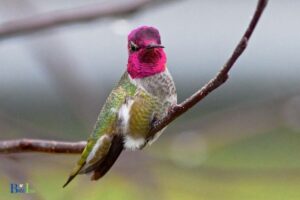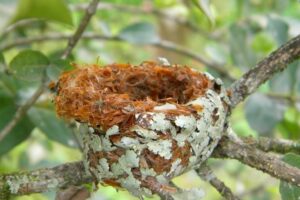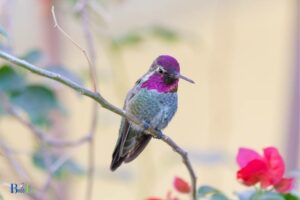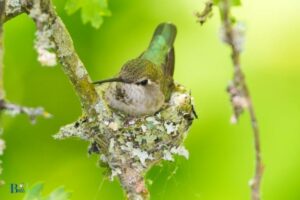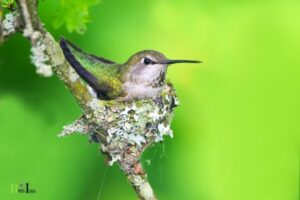Are Hummingbirds Good for Vegetable Gardens: Yes!
Yes, hummingbirds are beneficial for vegetable gardens as they help in pollination, pest control, and adding beauty to the garden.
Hummingbirds play a significant role in the ecosystem of a vegetable garden. They are excellent pollinators for a range of flowering plants, including vegetables.
As these tiny birds move from flower to flower sipping nectar, they spread pollen, resulting in increased fruit and vegetable production. Additionally, they also feed on various insects, helping to maintain a natural balance in the garden.
Hummingbirds are valuable assets to vegetable gardens. They contribute to the overall health of the garden by promoting pollination, controlling pests, and attracting other helpful insects.
Moreover, their bright colors and fascinating flight patterns add an enchanting touch to the garden, making it a more enjoyable space for gardeners and visitors alike.
5 Pros & Cons of Hummingbirds on Vegetable Gardens
| Pros of Hummingbirds in Vegetable Gardens | Cons of Hummingbirds in Vegetable Gardens |
| Pollination: Helps in the pollination process, improving plant reproduction. | Feeding on Nectar: Can sometimes prevent pollination by only taking nectar without touching the reproductive parts of the flower. |
| Pest control: Eats insects like aphids, ants, and mosquitoes, which can damage vegetable plants. | Competition: May compete with other beneficial insects for food sources. |
| Attracts other beneficial insects: Presence of hummingbirds can invite other beneficial insects like ladybugs, praying mantis, and lacewings. | Exclusion of other pollinators: Highly territorial behavior may scare away other important pollinators like bees and butterflies. |
| Biodiversity: Increases the biodiversity in your garden, supporting a healthier ecosystem. | Damage to flowers: Can sometimes damage delicate flowers with their beak while feeding on nectar. |
| Aesthetic appeal: Adds beauty and vibrancy to your garden, making it a more enjoyable space. | Limited variety: May pollinate specific flower types, limiting the variety of plants within the garden. |
Key Takeaway
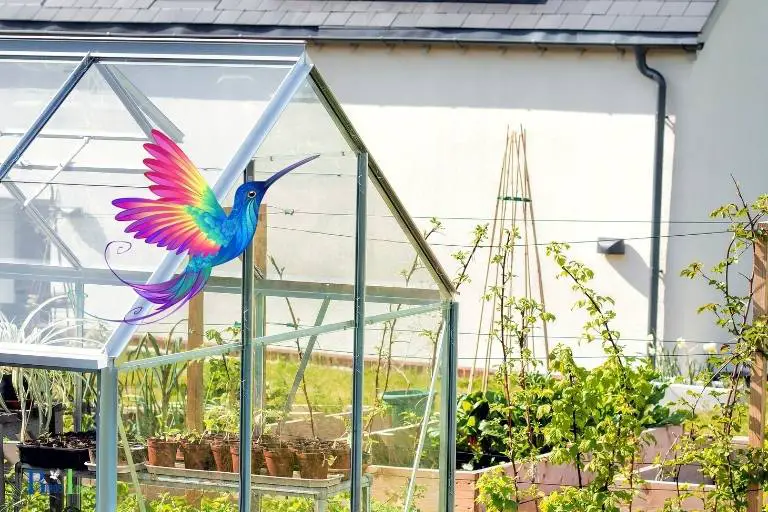
Five Facts About: Hummingbirds and Vegetable Gardens
Understanding Hummingbirds And Their Relationship With Vegetable Gardens
What Are Hummingbirds, And Why Are They Important For Vegetable Gardens?
Hummingbirds are small birds that are known for their ability to hover in the air by flapping their wings rapidly. While they are typically associated with flower gardens, they can also be beneficial for vegetable gardens.
Here are some reasons why:
- Hummingbirds are pollinators, which means they can help vegetables to produce fruits and seeds.
- They feed on the nectar of flowers, which can attract them to the garden and keep them coming back.
- Hummingbirds also eat insects, including pests that can damage vegetable plants.
What Draws Hummingbirds To Vegetable Gardens?
There are several things that can attract hummingbirds to vegetable gardens.
These include:
- Flowers that produce nectar, such as bee balm, cardinal flower, and salvia.
- Brightly colored vegetables, such as tomatoes and peppers, that can catch the birds’ attention and entice them to visit the garden.
- Water sources, such as bird baths or fountains, which can provide a place for the birds to cool off and drink.
How Do Hummingbirds Interact With Vegetable Gardens, And What Benefits Do They Provide?
Hummingbirds can interact with vegetable gardens in several ways:
- By pollinating plants: As they move from flower to flower, hummingbirds can transfer pollen from one plant to another, which can help vegetables to produce fruit and seeds.
- By controlling pests: Hummingbirds eat insects, including those that can damage vegetable plants, such as aphids and spider mites.
- By adding beauty: Hummingbirds are colorful and entertaining to watch, which can enhance the overall beauty and enjoyment of a vegetable garden.
Overall, hummingbirds can be a valuable addition to vegetable gardens, providing both practical and aesthetic benefits. By attracting these tiny birds to your garden, you can help to support a healthy and vibrant ecosystem in your backyard.
The Pros And Cons Of Hummingbirds In Vegetable Gardens
What Are The Advantages Of Having Hummingbirds In A Vegetable Garden?
- Hummingbirds are natural pollinators that collect nectar from flowers. They can efficiently transfer the pollen from flower to flower, resulting in higher yields in vegetable plants.
- Since hummingbirds consume insects and pests that can cause damage to vegetable plants, having them in your garden also works as a natural pest control system.
- The sound of their flapping wings and presence adds an enjoyable and charming aesthetic to your vegetable garden.
What Are The Potential Drawbacks Of Attracting Hummingbirds To Vegetable Gardens?
- While hummingbirds can be beneficial, they may also damage vegetable plants by plucking flowers and leaves to build their nests.
- Their presence can also attract other predatory animals such as cats and squirrels looking to feed on baby hummingbirds or raid the garden for food.
- Hummingbirds tend to prefer flowers over vegetables, so they may neglect to pollinate certain types of plants in the garden.
How Can Gardeners Manage And Mitigate The Negative Impacts Of Hummingbirds?
- To prevent hummingbirds from damaging plants, gardeners can create alternative nesting areas such as small trees or vines placed away from the garden.
- Building birdhouses or providing nectar feeders can also divert their focus from the vegetable plants.
- Planting specific types of flowers can attract hummingbirds while also encouraging pollination in the surrounding vegetable plants. Finally, creating a barricade around the garden or using fencing can prevent predators from entering the area.
How To Attract And Retain Hummingbirds In Your Vegetable Garden
Are Hummingbirds Good For Vegetable Gardens?
Hummingbirds are not only beautiful but also essential pollinators that can benefit any garden, including vegetable gardens. However, attracting and retaining these feathered friends requires some effort and planning.
In this post, we will explore ways to attract and retain hummingbirds in your vegetable garden and examine common mistakes gardeners make when attempting to attract them.
What Are The Best Plants To Attract Hummingbirds To A Vegetable Garden?
When it comes to attracting hummingbirds, planting the right flowers is crucial.
Here are some of the most attractive plants for hummingbirds:
- Bee balm: Produces nectar-filled tubular flowers that attract hummingbirds.
- Salvia: Comes in a variety of colors and sizes, making it easy to find one that suits your taste.
- Trumpet vine: Produces vibrant orange flowers that hummingbirds can’t resist.
- Cardinal flower: Produces tubular, bright red flowers that attract not only hummingbirds but also butterflies.
What Are Some Other Ways To Encourage Hummingbirds To Visit And Remain In A Vegetable Garden?
Attracting hummingbirds to your vegetable garden is not just about planting the right flowers.
Here are some additional tips:
- Provide a hummingbird feeder: Fill the feeder with a mixture of four parts water to one part table sugar, and place it near the vegetable garden.
- Provide a water source: Hummingbirds love to bathe and will appreciate a shallow bowl of water to splash around in.
- Avoid using pesticides: Pesticides can harm hummingbirds, so choose natural pest control methods instead.
- Use bright-colored garden decorations: Bright colors like red, pink, and orange can catch a hummingbird’s eye and attract them to your garden.
What Are Some Common Mistakes Gardeners Make When Attempting To Attract Hummingbirds, And How Can These Mistakes Be Avoided?
Gardeners often make mistakes when trying to attract hummingbirds to their gardens.
Here are some common ones and how to avoid them:
- Planting the wrong flowers: Not all flowers attract hummingbirds, so make sure to research which ones do.
- Not providing a water source: Hummingbirds need water to bathe and drink, so make sure to provide a shallow bowl of water in your garden.
- Placing the feeder in the wrong spot: Hummingbird feeders should be placed in a shady area away from predators.
- Using pesticide: Pesticides can harm hummingbirds, so use natural pest control methods instead.
Attracting hummingbirds to your vegetable garden is entirely possible, and it can benefit not only your garden but also the environment.
By planting the right flowers, providing a water source, and avoiding common mistakes, you can create a hummingbird-friendly garden that these beautiful creatures will love to visit.
Essential Practices For Maximizing The Benefits Of Hummingbirds In Vegetable Gardens
Do Hummingbirds Play A Role In Pollinating Vegetable Plants, And If So, How Can Gardeners Capitalize On This Benefit?
Hummingbirds are indeed pollinators and can be a valuable asset for gardeners looking to increase their vegetable garden yield.
By flitting from plant to plant to feed, hummingbirds transfer pollen from one flower to another, aiding in the pollination process.
Gardeners can capitalize on this benefit by planting flowering plants that attract hummingbirds in or around their vegetable gardens. Some hummingbird-friendly plants include bee balm, cardinal flower, and coral honeysuckle.
How Can Gardeners Create An Optimal Environment For Hummingbirds To Thrive, Thus Ensuring Maximum Benefits For Their Vegetable Gardens?
Creating an optimal environment for hummingbirds involves providing the necessary habitat for them to feed, breed, and rest.
Here are some tips to help gardeners create a hummingbird-friendly environment:
- Plant flowering plants that provide nectar for hummingbirds.
- Use red-colored feeders with a sugar-water mixture to attract hummingbirds.
- Provide shelter such as small trees, bushes, or vines for hummingbirds to rest and nest.
- Keep the area around the hummingbird feeders and plants clean and free of debris and insects.
- Place feeders and plants away from areas where cats and other predators can easily access them.
What Additional Practices Can Gardeners Incorporate To Enhance The Benefits Of Hummingbirds In Their Vegetable Gardens?
In addition to planting hummingbird-friendly plants and creating a conducive environment for hummingbirds, there are a few additional practices that gardeners can incorporate to enhance the benefits of hummingbirds in their vegetable gardens.
- Mulch vegetable beds to retain moisture and provide shade to the soil, which can attract insects, an important food source for hummingbirds.
- Plant a variety of vegetables to provide a diverse food source for hummingbirds.
- Avoid using pesticides that can harm hummingbirds and other beneficial insects.
- Rotate crops to maintain healthy soil and reduce pest infestations, which can indirectly benefit hummingbirds by providing a healthier environment for them to feed.
By implementing these essential practices for maximizing the benefits of hummingbirds in vegetable gardens, gardeners can provide a sustainable, natural, and cost-effective way to promote pollination, which leads to higher vegetable yields.
FAQ Of Are Hummingbirds Good For Vegetable Gardens
Do Hummingbirds Pollinate Vegetables In Gardens?
Do Hummingbirds Eat Harmful Insects In Vegetable Gardens?
Can Hummingbirds Harm Vegetable Gardens?
Do Hummingbirds Attract Pests To Vegetable Gardens?
How Can I Attract Hummingbirds To My Vegetable Garden?
Conclusion
As we wrap up our discussion on the role of hummingbirds in vegetable gardens, we can conclude that these tiny birds are indeed beneficial for your plants. Not only do they contribute towards pollination, but they also help in keeping pesky insects at bay.
Hummingbirds are attracted to the nectar produced by flowers, which makes them a great natural pesticide for your vegetable garden. By keeping your garden free of harmful pests, they help increase the yield of crops and improve their overall health.
However, it’s important to remember that hummingbirds are not the only solution to pest control in your garden and it’s necessary to maintain a balance in the ecosystem.
By providing a healthy habitat for hummingbirds and other beneficial creatures, we can create a sustainable environment that supports both our gardens and our planet.

